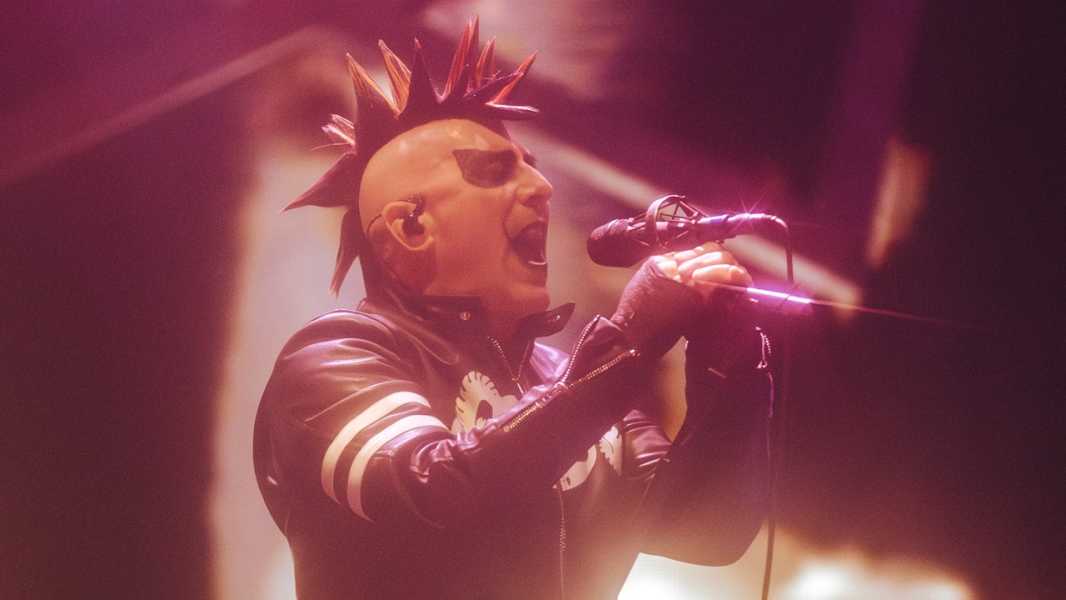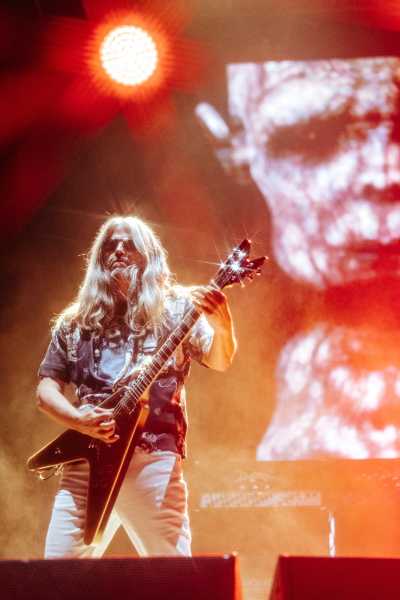
Save this storySave this storySave this storySave this story
If you were listening to rock radio in the early nineteen-nineties, you might have heard a song called “Sober,” which reflected the genre’s new mood. In the wake of Nirvana’s success, rock and roll was growing more sullen and more introverted, embracing dark colors and minor keys. “Sober,” which was released in 1993, had a heavy neck-snapping rhythm and a howling, tormented refrain: “Why can’t we not be sober? / I just want to start this over.” The song was a breakthrough hit for a California band called Tool, which played the Lollapalooza tour the same year, and made a sufficiently impressive racket to be elevated from the second stage to the main stage, joining Alice in Chains and Rage Against the Machine.
Back then, bands such as these were often classified as “alternative,” a rather vague and cringeworthy term that nevertheless turned out to be a pretty good description of Tool, which has spent the past three decades building an impressive following, and legacy, by stubbornly refusing to act the way rock bands are supposed to. Maynard James Keenan, the lead singer, is a soft-spoken but prickly presence: in one old interview, broadcast on MTV Europe, he described his life on tour as “one great big crabstick,” or maybe “crapstick,” and extolled a legendary book from the nineteen-forties that was eventually determined, by the band’s monomaniacal fans, to not exist. The Tool discography is austere and sublime: five full-length albums over thirty or so years, full of thunderous, complex riffs that resemble elegant mathematical equations. This past weekend, during the second of two sold-out Tool concerts at Madison Square Garden, just about everyone in the room seemed to be wearing a black Tool T-shirt, creating an ecstatic, insular atmosphere, as immersive as a great d.j. set. “Take the journey with us,” Keenan commanded, early in the night. “Turn your fucking phone off, put it in your pocket, leave it in your pocket—stay here.”
You can’t really sing along at a Tool concert—the lyrics often sound as if they were drawn from the least-read book in a very old library (“Concede suddenly / To the quickened dissolution / Pray we mitigate the ruin”); to his credit, Keenan has a hypnotic way of intoning them that deëmphasizes the words. You can’t really nod along, either, at least not for long, because the band generally eschews anything with a simple beat. “Pneuma,” from Tool’s most recent album, “Fear Inoculum,” has a riff that evokes the lumbering gait of a wounded behemoth. One helpful listener on the band’s Reddit page suggested that the bass line might be thought of as a series of alternating two- and three-beat figures: two-three-three-three-three-two-three-three-three-three-two-three, which adds up to thirty-three, if you’re counting, as some of the fans in Madison Square Garden surely were.
In keeping with Tool tradition, Keenan spent the night tucked into a back corner of the stage, and during longer instrumental passages he sometimes seemed to disappear entirely—in search, perhaps, of someplace less crapstickular. Meanwhile, the band’s absurdly dexterous drummer, Danny Carey, was center stage, under the brightest lights, where anyone counting to thirty-three could keep careful watch as he communed with his multifarious kit. Carey is the band’s most joyful performer and its most flamboyant. There was an intermission followed by a drum solo, and, although some people might consider this sequence of events redundant, in this arena it made perfect sense. As people wandered back to their seats, some of them having enlarged their collections of black Tool T-shirts, they seemed to enjoy watching Carey pattering around the edge of a giant gong.
Is this what concerts used to be like? Sort of. For a few years in the nineteen-seventies, progressive-rock bands filled arenas with music that emphasized grandeur and complication; even in the eighties, casual fans were expected to recognize the instrumental accomplishments of their favorite virtuosos. (The first rock concert I ever saw was by David Lee Roth, in 1988; his band included the guitarist Steve Vai and the bassist Billy Sheehan, both of whom were regularly celebrated in Guitar Player magazine.) The rise of moody “alternative” bands helped change that, although virtuosity didn’t entirely disappear—for instance, Tom Morello, from Rage Against the Machine, soon emerged as a new kind of guitar hero. (Guitar Player put him on the cover in 2000, with a headline that read, “Sonic Anarchist: Rage Against the Machine’s Tom Morello Strikes Down Tonal Conformity.”) By contrast, music made on computers offers fewer opportunities for showing off, unless you have a microphone, which means that vocalists are even more prominent than they used to be. It is no coincidence that virtually all of today’s top sellers are solo singers or rappers, not bands—with the telling exception of K-pop groups, in which pretty much everyone gets a microphone.
In sensibility, too, Tool is old-fashioned. During one early interview, the members said that they were interested in “political issues,” and the band’s songs often hinted at the esoteric. “Lateralus,” the group’s 2001 magnum opus, ended with a snippet of an AM-radio broadcast about a military coverup of alien activity at Area 51. And “Ænima,” from 1996, came with liner notes that extolled the “dissociative” powers of ketamine, a then obscure intoxicant that was declared a controlled substance in America three years later. (Nowadays, ketamine is much more widely known, although Keenan has come to be more closely associated with a different intoxicant: he lives in Arizona, where he is the proprietor of a wine company that is proud to produce “some of Southwest’s most delicate and refined bottles.”) In the current era, “political” often means “partisan”—even esoteric beliefs tend to be recognizably reddish or blueish. What is striking about a Tool concert in 2023 is how unpolitical it is: for about two hours, members of whatever political tribe are invited to tuck their phones away and try in vain to nod along.

Adam Jones, Tool’s guitarist, playing at Madison Square Garden.
There is a superficial similarity between Tool’s career and that of another nineties band that spiralled out into its own world. Radiohead, after a rock hit of its own (“Creep”), became one of the most celebrated British bands of all time, expanding its palette and ambition while cultivating a hip and highbrow sensibility. By contrast, there is something unpretentious about Tool’s artsy experiments, which have enough snap and snarl to sound terrific coming out of even the tinniest car speakers, and which seem calculated to delight both drug-addled weirdos and hyped-up dudes in skater jeans. (There was clear evidence of one of those demographics at the Garden, and circumstantial evidence of the other.) One way Tool deflates its own pretension is with dumb jokes: “Ænima,” the album title, is both a psychological allusion and a scatological pun; even the band’s name can be said with a smirk, as reflected in an early logo that depicted a wrench with a double box-end at the base of the shaft.
Most Tool songs do sound tooled—that is, painstakingly built, rather than written. And over the decades this process has evidently grown more time-consuming. Thirteen years passed between “10,000 Days,” in 2006, and “Fear Inoculum,” which arrived in 2019 and is a bit more subdued and methodical than its predecessors. But Saturday’s show, which included “Sweat,” a less commonly performed song from 1992, made a convincing argument that Tool’s discography might be considered one long, glorious composition, with Justin Chancellor, the bassist, fortifying Carey’s rhythms and Adam Jones, the guitarist, sometimes joining them and sometimes striking out with solos full of long, mournful notes winding around the clattering rhythms. A few fans were disappointed by the set list, which excluded “Sober” and a number of other favorites, but it was hard to argue with its cumulative effect, which was accurately described, online, by at least one concertgoer as “fucking epic.”
Tool somehow seems more mysterious now than it did in 1993. One gets the sense that even the four members might not be quite sure where these songs come from, or why they reach as far as they do. Last fall, Tool was one of the headliners at the Power Trip festival, which was held on the same California field as Coachella. The band played alongside Iron Maiden, Guns N’ Roses, Judas Priest, AC/DC, and Metallica: five monsters of rock, plus one mutant. Of course, the mutant is a monster, too—it seems as if Tool could entertain crowds this big indefinitely, and maybe that’s the plan. After the set on Saturday night, Keenan gave brisk, businesslike fist and elbow bumps to the other three members, and then disappeared as they took their bows. They had a few days off, and then they had to get back to work: more sold-out concerts, this time in Hollywood, Florida, and doubtless more fans in black, ready to take the journey. ♦
Sourse: newyorker.com






